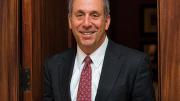This past year, the Harvard Alumni Association has hosted global programs of which my predecessors could only dream—moderated conversations that attracted thousands of participants representing more than one hundred countries around the world. In February, I joined one such gathering as the sun was rising to speak with hundreds of alums living and working in some ninety nations. Our lively discussion touched on the pandemic and its effects on higher education, of course, but the majority of our time together was focused on the state of the University, the fulfillment of our mission, and the role that Harvard might play in addressing some of the greatest challenges facing humanity. At the end of the event, I felt energized and optimistic. Then I clicked out of the meeting, ate some breakfast, and went back to work on Zoom—all from my home office.
I am fond of saying that Harvard is its people. In just two years, necessity and technology have converged and upended our assumptions about the nature of community. We no longer need to be in the same room—or even in the same time zone—to strengthen our ties to one another and to the University that continues to mean so much to us. I believe that this era in our shared history has been as much about creativity and innovation as disruption and uncertainty. Every month brought new ideas and experiments. Many classes adopted virtual programming—including panels, presentations, even play readings—to stay connected. Networking events went online, strengthening personal and professional relationships. Interest-specific open houses and faculty lectures enabled deeper engagement with the cultural and intellectual resources that abound at Harvard.
We saw the same kinds of experimentation among faculty and staff across the University, who shaped and reshaped the contours of teaching and learning at breakneck speed. An outstanding well of expertise was tapped more deeply because invitations could be considered without the added expense of travel time, creating avenues to enhance course materials with firsthand accounts and personal interactions. Imagine being a graduate student in Harvard Medical School and hearing directly from a chief medical officer of the New York Public Health Department one day and a global health expert based in Rwanda the next. Imagine being an undergraduate in introductory economics and asking questions of two former chief economists at the International Monetary Fund, a former chair of the Federal Reserve, a former chair of the Council of Economic Advisers, a former chief economist at the U.S. Treasury Department, and two former Secretaries of the Treasury. These are just two examples of the kinds of experiences our students have had over the past two years, all without adding to our carbon footprint.
We have also started to realize the dream of an academic landscape free of impediments, as faculty continue to embrace new tools that expand their reach—and the reach of ideas with broad appeal. Two courses open to all—Justice: Ethics in an Age of Pandemic and Racial Reckoning with Anne T. and Robert M. Bass Professor of Government Michael Sandel and Confronting Climate Change: A Foundation in Science, Technology, and Policy with Sturgis Hooper Professor of Geology and Professor of Environmental Science and Engineering Dan Schrag—enrolled hundreds of undergraduate, graduate, and professional students, and attracted hundreds more alums and faculty. When we think about the role and responsibility of Harvard in the world, these kinds of convenings stand out. We can—and should—continue to create opportunities that fully leverage the perspectives and talents that exist across the University.
While the experience of living and working on campus is unique—and indisputably invaluable—so, too, are aspects of this time of ingenuity and persistence. We must work to ensure that we keep the best of what our faculty and staff have accomplished and embraced to better all programs of study—degree and non-degree; in-person, hybrid, and remote—and to strengthen our community worldwide. We have opened our aperture and discovered possibilities beyond what any of us could have imagined just two years ago. Widening it further to illuminate the future is up to all of us.
Sincerely,
Lawrence S. Bacow
President









